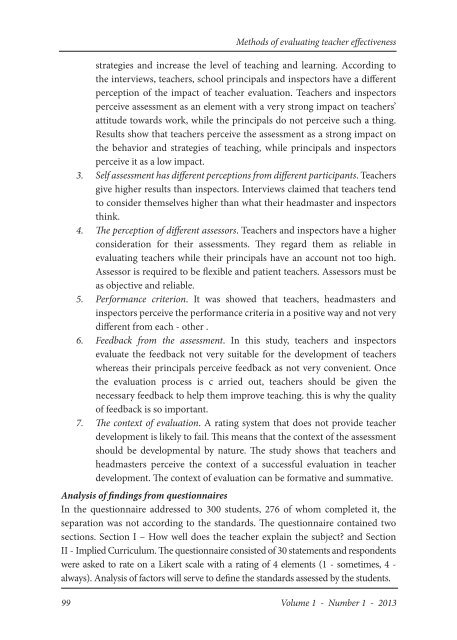Download - qendra per arsim demokratik
Download - qendra per arsim demokratik
Download - qendra per arsim demokratik
You also want an ePaper? Increase the reach of your titles
YUMPU automatically turns print PDFs into web optimized ePapers that Google loves.
Methods of evaluating teacher effectivenessstrategies and increase the level of teaching and learning. According tothe interviews, teachers, school principals and inspectors have a different<strong>per</strong>ception of the impact of teacher evaluation. Teachers and inspectors<strong>per</strong>ceive assessment as an element with a very strong impact on teachers’attitude towards work, while the principals do not <strong>per</strong>ceive such a thing.Results show that teachers <strong>per</strong>ceive the assessment as a strong impact onthe behavior and strategies of teaching, while principals and inspectors<strong>per</strong>ceive it as a low impact.3. Self assessment has different <strong>per</strong>ceptions from different participants. Teachersgive higher results than inspectors. Interviews claimed that teachers tendto consider themselves higher than what their headmaster and inspectorsthink.4. The <strong>per</strong>ception of different assessors. Teachers and inspectors have a higherconsideration for their assessments. They regard them as reliable inevaluating teachers while their principals have an account not too high.Assessor is required to be flexible and patient teachers. Assessors must beas objective and reliable.5. Performance criterion. It was showed that teachers, headmasters andinspectors <strong>per</strong>ceive the <strong>per</strong>formance criteria in a positive way and not verydifferent from each - other .6. Feedback from the assessment. In this study, teachers and inspectorsevaluate the feedback not very suitable for the development of teacherswhereas their principals <strong>per</strong>ceive feedback as not very convenient. Oncethe evaluation process is c arried out, teachers should be given thenecessary feedback to help them improve teaching. this is why the qualityof feedback is so important.7. The context of evaluation. A rating system that does not provide teacherdevelopment is likely to fail. This means that the context of the assessmentshould be developmental by nature. The study shows that teachers andheadmasters <strong>per</strong>ceive the context of a successful evaluation in teacherdevelopment. The context of evaluation can be formative and summative.Analysis of findings from questionnairesIn the questionnaire addressed to 300 students, 276 of whom completed it, theseparation was not according to the standards. The questionnaire contained twosections. Section I – How well does the teacher explain the subject? and SectionII - Implied Curriculum. The questionnaire consisted of 30 statements and respondentswere asked to rate on a Likert scale with a rating of 4 elements (1 - sometimes, 4 -always). Analysis of factors will serve to define the standards assessed by the students.99Volume 1 - Number 1 - 2013


